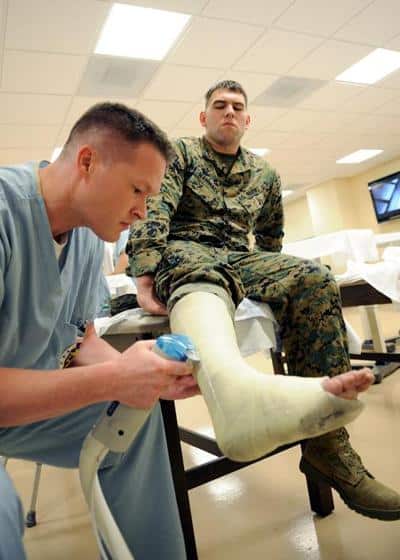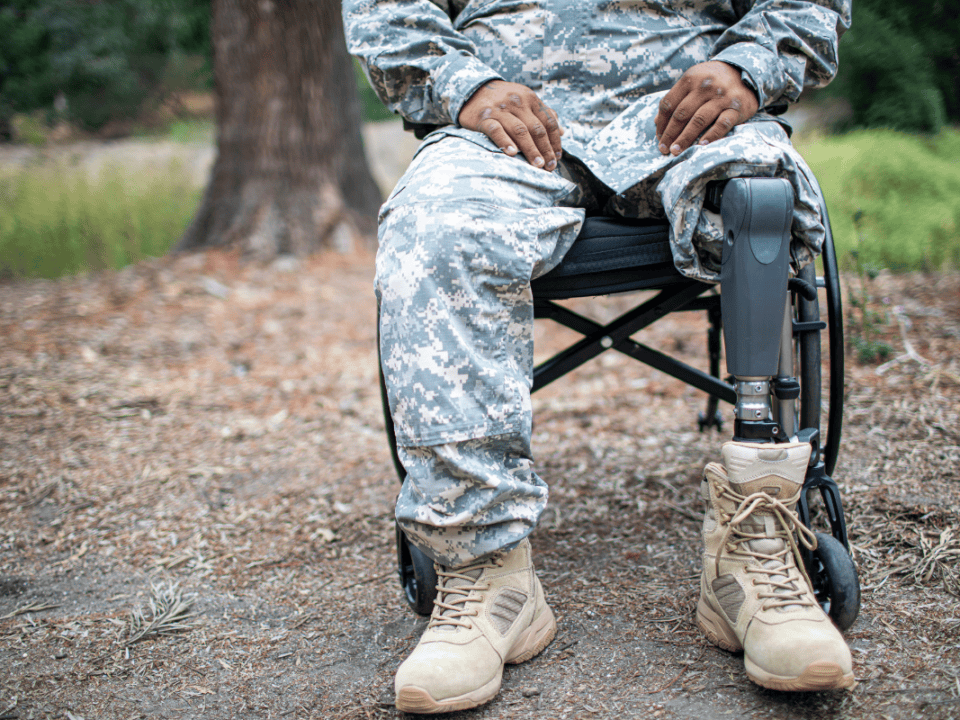From strained back muscles to broken bones, orthopedic injuries can be serious and cause major issues for veterans.
 While in service, veterans are often loading heavy machinery onto trucks, hauling ammunition, and doing many other physically demanding tasks. These responsibilities can take a toll on veterans’ bodies for years after their service ends.
While in service, veterans are often loading heavy machinery onto trucks, hauling ammunition, and doing many other physically demanding tasks. These responsibilities can take a toll on veterans’ bodies for years after their service ends.
Of the around 60,000 U.S. military service members injured in combat during the Afghanistan and Iraq wars, 40% have suffered fractures, traumatic amputations, and injuries to the spine. With 64% of those with combat-related bone and joint injuries also becoming permanently disabled.
There are several common noncombat bone and joint injuries that military service members frequently report when they return from their deployment. Some of those injuries include shoulder dislocations and anterior cruciate ligament (ACL) injuries of the knee. Military service members are nearly five times more likely to experience these injuries than is the rest of the civilian population.
Do I qualify for disability benefits for my orthopedic injury?
To qualify for benefits, we must be able to establish:
- An in-service event or injury
- A current diagnosis of an orthopedic injury or condition
- A nexus between the in-service event and your diagnosis
You might also qualify if we can prove that your service exacerbated an existing condition.
Proving that your injuries constitute a disability will require us to prove to the Department of Veterans Affairs (VA) that you have suffered functional loss in one or more of the following areas through a series of medical exams:
- Weakness
- Atrophy
- Limitation of motion
- Deformity
- Pain
What are the most common orthopedic injuries?
- Joints (e.g., shoulders, elbows, hip, knee, ankle): If you have a joint condition, your best bet is to establish limitation of range of motion with measurements and show that it greatly reduces function and interferes with your everyday life.
- Muscles: The VA ranks muscle injuries from mild to severe. Muscle injuries can be penetrating (e.g., gunshot or shell fragment wound) or non-penetrating (e.g., muscle tear). X-rays will show debris present in the muscle, atrophy, tears, and other serious damages to the muscle.
- Bone fractures: The severity of a broken bone depends on the force that caused the break. Open fractures are particularly severe as they can cause the bone fragments to penetrate the skin. In some cases, broken bones can cause infections or nerve damage, causing additional complications. We will provide medical reports to help establish the severity and impact of the break.
- Spine: Lower back injuries are some of the most common injuries among veterans. Spine injuries can be difficult to rate, but generally, we will use the range of motion measurements to establish limitations of motion. Abnormal spine contour, muscle spasms, and pain with movement can all affect ratings.
- Amputation: The rating for a service-related amputation will depend on whether the amputation was complete or partial, what part of the body required amputation, and any complications arising from the amputation.
It is very important that the medical examinations provided to the VA are complete and include general, orthopedic, surgical, and neurological exams, as well as special examinations relating to the condition. Failure to provide thorough medical reports may cause the VA to doubt the severity of your orthopedic injuries and deny you benefits.
Secondary conditions
Orthopedic conditions often cause additional (secondary) disability and injury. For example, if a veteran injured his knee in service and develops arthritis as a result, the VA might consider arthritis a service-connected injury.
We can help you recover benefits for your orthopedic injuries
Disability benefits are essential to help disabled veterans take care of themselves and their families, especially if they are unable to work. Yet, the VA often finds many reasons to deny benefits to injured veterans.
Our SC Vet Advocates team is made up of attorneys who have served in the military, so we understand the ways that military life is truly unique. We would be happy to sit down with you and discuss your situation and help you decide on what steps you may need to take next to get the help you need and deserve. Fill out the form to request a consultation with the Bluestein’s Veteran Disability team.




